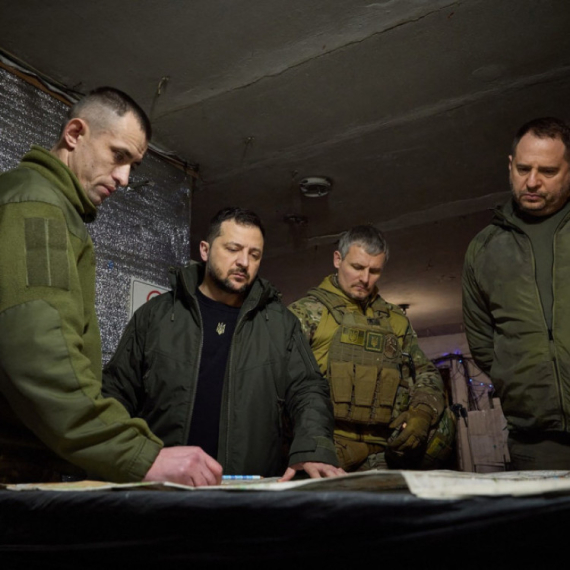"Question of status burdens Kosovo talks"
Minister for Kosovo Goran Bogdanović says the current Belgrade-Priština talks are burdened by the fact that "all topics in the end concern Kosovo's status".
Tuesday, 03.05.2011.
15:16

Minister for Kosovo Goran Bogdanovic says the current Belgrade-Pristina talks are burdened by the fact that "all topics in the end concern Kosovo's status". In an interview for the Belgrade-based Beta news agency on Monday, Bogdanovic spoke in favor of "more pragmatism in order to solve concrete questions in those negotiations". "Question of status burdens Kosovo talks" "These three rounds of talk between Belgrade and Prisitina have shown that compromise is possible, even if the topics discussed are very sensitive and difficult," he said, and added that this was one of the reasons why it was "an illusion to expect concrete results to be visible right away". "Perhaps my only objection to all that is that we have opened up many topics - electricity, telecommunications, freedom of movement, personal documents, license plates, land books, customs seals - without bringing any to a close, however, I think we will soon start reaching results. We have long held opposing positions and compromise seemed impossible, but these three rounds (of talks) have shown that it can be reached," asserted the minister. Bogdanovic stated that the political crisis in the province was one of the reasons why "it will take time for results to be visible", and said that other reasons for this included "Pristina's attempts to push Belgrade out of Kosovo", as well as that "every topic is burdened by the status". Kosovo's ethnic Albanians in February 2008 unilaterally declared independence, but Serbia rejected this as an illegal act of separatism. Bogdanovic now says that the ongoing dialogue "will obviously have Kosovo's status as a subject, since all the problems touch on the status". He also believes that the "international community" will become aware that the status is yet to be resolved. "If we wish to have not only a European future, if we wish to move toward Europe, we must solve some problems, and in order to solve them we must resolve the status of Kosovo, which will not be solved unless Serbia accepts it, too," the minister was quoted as saying, and adding that the talks were a chance for "Serbs and Albanians and all of the Western Balkans to achieve historic reconciliation". "I think this illusion harbored by Pristina to push Belgrade out of Kosovo and Metohija at any price will not work. This is burdening the talks to an extent, this position held by Pristina that Kosovo is independent and that Belgrade has no business there, that Pristina should decide on everything, while Belgrade should only help and influence Serbs to accept the Kosovo institutions," continued Bogdnovic. In reference to the Serb-dominated north and the southern parts of the province where they live in isolated enclaves, he went on to say that there were in fact "two realities in Kosovo - one south, and another north of the Ibar River". "We are witnessing all sorts of strategies... which are attempting to impose a solution for the Serbs of Kosovo and Metohija, especially those in the north," said he. "Our position is clear: any solution that would not agreed to by Serbs and Belgrade would be an utopia," Bogdanovic asserted. Serbs north of the Ibar do not accept the authority of the government in Pristina. The minister said that he had not seen "the new strategy for the north" prepared by Pristina, and that the only information he had about it was from media reports in Kosovo. The first such "strategy", produced a year ago with the support of the International Civilian Office (ICO), failed to yield results. "An overwhelming majority of Serbs are against the strategy, integration and strengthening of the Kosovo institutions in the north, which was evident during attempts at unilateral solutions for the court in Kosovska Mitrovica," he continued. "All that can neither be tolerated nor accepted - Pristina's unilateral moves aimed at the north are unacceptable both to official Belgrade, and to the residents of the north". Bogdanovic said Serbia would oppose this "in a democratic manner". Asked to comment on recent statements that Belgrade was also ready to talk about a partition of Kosovo, he told the news agency that this was perhaps possible in the context of the "two realities that exist north and south of the Ibar". "Partitioning is not our position not only because of the Constitution, but also because we believe that is not the way to solve problems", said Bogdanovic, and added that it was "clear that Belgrade is fighting for the entire territory of Kosovo and Metohija". But the minister noted that some in the international community - which holds different views on Kosovo - "think that a partition is the solution". "The position of Belgrade is completely clear, we are ready to talk about everything, including that topic, if it is put forward, but that does not mean that we will put it forward and initiate it," Bogdanovic concluded. Goran Bogdanovic (Beta, file)
"Question of status burdens Kosovo talks"
"These three rounds of talk between Belgrade and Prišitina have shown that compromise is possible, even if the topics discussed are very sensitive and difficult," he said, and added that this was one of the reasons why it was "an illusion to expect concrete results to be visible right away"."Perhaps my only objection to all that is that we have opened up many topics - electricity, telecommunications, freedom of movement, personal documents, license plates, land books, customs seals - without bringing any to a close, however, I think we will soon start reaching results. We have long held opposing positions and compromise seemed impossible, but these three rounds (of talks) have shown that it can be reached," asserted the minister.
Bogdanović stated that the political crisis in the province was one of the reasons why "it will take time for results to be visible", and said that other reasons for this included "Priština's attempts to push Belgrade out of Kosovo", as well as that "every topic is burdened by the status".
Kosovo's ethnic Albanians in February 2008 unilaterally declared independence, but Serbia rejected this as an illegal act of separatism.
Bogdanović now says that the ongoing dialogue "will obviously have Kosovo's status as a subject, since all the problems touch on the status".
He also believes that the "international community" will become aware that the status is yet to be resolved.
"If we wish to have not only a European future, if we wish to move toward Europe, we must solve some problems, and in order to solve them we must resolve the status of Kosovo, which will not be solved unless Serbia accepts it, too," the minister was quoted as saying, and adding that the talks were a chance for "Serbs and Albanians and all of the Western Balkans to achieve historic reconciliation".
"I think this illusion harbored by Priština to push Belgrade out of Kosovo and Metohija at any price will not work. This is burdening the talks to an extent, this position held by Priština that Kosovo is independent and that Belgrade has no business there, that Priština should decide on everything, while Belgrade should only help and influence Serbs to accept the Kosovo institutions," continued Bogdnović.
In reference to the Serb-dominated north and the southern parts of the province where they live in isolated enclaves, he went on to say that there were in fact "two realities in Kosovo - one south, and another north of the Ibar River".
"We are witnessing all sorts of strategies... which are attempting to impose a solution for the Serbs of Kosovo and Metohija, especially those in the north," said he.
"Our position is clear: any solution that would not agreed to by Serbs and Belgrade would be an utopia," Bogdanović asserted.
Serbs north of the Ibar do not accept the authority of the government in Priština. The minister said that he had not seen "the new strategy for the north" prepared by Priština, and that the only information he had about it was from media reports in Kosovo.
The first such "strategy", produced a year ago with the support of the International Civilian Office (ICO), failed to yield results.
"An overwhelming majority of Serbs are against the strategy, integration and strengthening of the Kosovo institutions in the north, which was evident during attempts at unilateral solutions for the court in Kosovska Mitrovica," he continued.
"All that can neither be tolerated nor accepted - Priština's unilateral moves aimed at the north are unacceptable both to official Belgrade, and to the residents of the north".
Bogdanović said Serbia would oppose this "in a democratic manner".
Asked to comment on recent statements that Belgrade was also ready to talk about a partition of Kosovo, he told the news agency that this was perhaps possible in the context of the "two realities that exist north and south of the Ibar".
"Partitioning is not our position not only because of the Constitution, but also because we believe that is not the way to solve problems", said Bogdanović, and added that it was "clear that Belgrade is fighting for the entire territory of Kosovo and Metohija".
But the minister noted that some in the international community - which holds different views on Kosovo - "think that a partition is the solution".
"The position of Belgrade is completely clear, we are ready to talk about everything, including that topic, if it is put forward, but that does not mean that we will put it forward and initiate it," Bogdanović concluded.































Komentari 17
Pogledaj komentare